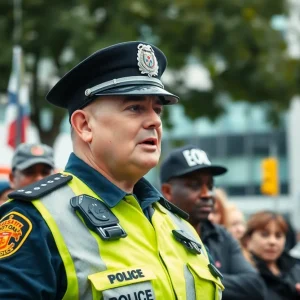Asheville Police Department Prioritizes Officer’s Mental Health After Recent Shooting
In an event that shook the Asheville community, a tense situation unfolded earlier this week leading to the city’s first officer-involved shooting in four years. Known for their meticulous methods and mitigation techniques to prevent such incidents, the Asheville Police Department has now turned their focus towards dealing with the aftermath, particularly the mental health of their officers.
Summary of the Incident
On Tuesday, August 27th, a tense scene broke out at the residence of 58-year-old Chad Herman. Police report indicates that Herman pointed a firearm at officers and bystanders present outside his domicile. When Herman failed to obey orders to drop his weapon, officers took decisive action, resulting in his death. An investigation into the incident is currently ongoing.
Officer Wellbeing: A Shared Responsibility
Police Chief Mike Lamb, no stranger to incidents of this nature, communicated his understanding regarding the trauma associated with officer-involved shootings, emphasizing the importance of mental health within the police force. He referred to the incident as a “traumatic situation”, vowing that adequate support would be provided to all officers present during the event as well as the officer directly involved.
“We have several layers in place that offer support. These include a peer support team that helps officers navigate through the emotional chaos that such incidents can leave in their wake,” Lamb said.
The Peer Support Team: An Integral Part of APD
Lt. Diana Loveland leads the peer support team, which consists of officer-level to captain-level personnel. The team’s primary objective is to provide moral and emotional support throughout the department’s ranks. The squad, usually comprising around 25 officers, is specially trained to deal with colleagues affected by critical incidents.
Understanding, Not Just Support
“Our peers can provide something no one else can: they have been in our shoes. Talking to someone who’s never been through a critical incident won’t provide the same compassion or understanding of what we’re experiencing,” Loveland said, underpinning the importance of the peer support team.
She further emphasized that while the members of the peer support team are not professional psychologists, they are trained to recognize when an officer may need more professional intervention. This balance between personal understanding and professional recognition has helped more and more officers in dealing with trauma and stress.
Preventing Future Tragedies
Loveland explains that officers never anticipate fatalities when arriving on the scene. The death of a citizen is not an outcome anyone hopes for, even though it’s sometimes unavoidable. “Having a peer support program to help them through critical incidents is an important part of their recovery. Because what doesn’t affect you today might affect you tomorrow.”
The peer support program is fundamentally about establishing relationships with officers to provide an environment where they can share their experiences without fear of judgment. Loveland says that acknowledging these feelings as normal, instead of bottling them up, can be profoundly healing. Furthermore, she claims that stress management and knowing how to deal with critical incidents are critical for prolonging officers’ careers.
The Broader Message
The crux of the Asheville Police Department’s approach to mental health lies in its dedication towards officer wellbeing. The department’s goal is to ensure that the men and women in uniform know that there’s always someone willing to listen and understand their struggles. The incident this week has proved a poignant reminder of the need for such support systems within policing.






